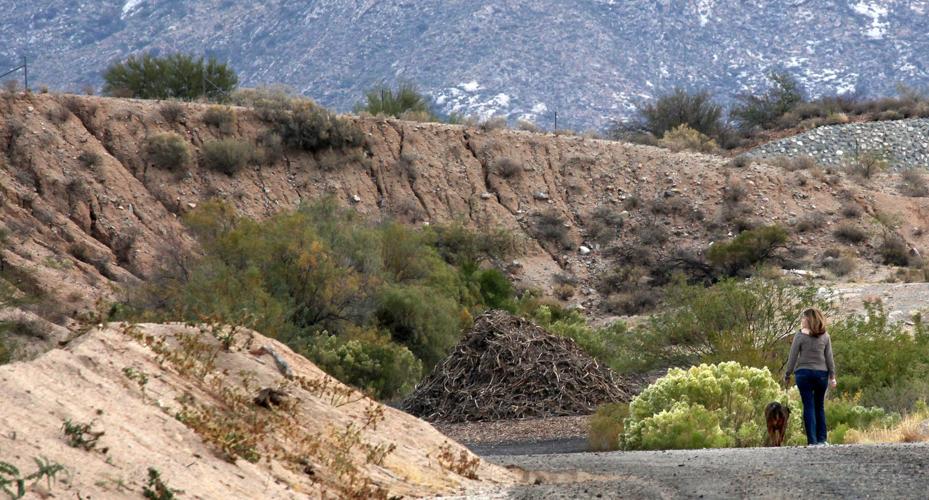If the packed Town Council meeting last Wednesday was any indication, there will be many Oro Valley residents hoping to weigh in next week on the $17 million proposal to develop the 213-acre Naranja Park.
The plan includes three lighted multi-sports fields, a four-field baseball and softball complex, pedestrian walkways, a playground, parking and other amenities. The costs would be covered by general obligation bonds, which would be paid back over 20 years with revenues from a secondary property tax that would have to be approved by voters.
The monthly cost to a homeowner whose property is worth $250,000 would be around $4.50. Town officials said the plan is in response to public demands for more recreational opportunities.
“(There is) such a need, our fields are such a hot item,” Tucson Soccer Academy coach Amy Garnand said after the council voted unanimously to have the plan presented for community input on April 19. “We just can’t get enough space for all these kids, and we’re not the only club in Oro Valley, and we’re not the only sport.”
If the public shows “overwhelming” support for the project, the council could vote to put the bond measure on the November ballot as soon as May 3, Mayor Satish Hiremath told the Star.
The town purchased the park property, where there are already some fields and an archery range, in 2000. Voters shot down a previous $48.6 million bond proposal to develop the park in 2008 by a 15-point margin.
Dozens of residents, including many parents and their uniform-clad children supporting the park, filled council chambers last week, though only to listen, as public comments on the regular agenda item were not accepted per longstanding council policy.
During the call to the audience, Oro Valley resident Karen Stratman shared concerns about the budget and impact of the town’s controversial 2014 purchase of several golf courses. She briefly referenced general obligation bonds for the park, saying, “I strongly feel that adding a bond or revenue sources is not a solution at this time.”
Councilman Steve Solomon quickly cut Stratman off by raising a point of order.
“I thought the call to the audience, you weren’t allowed to speak to any item on the agenda?” he asked town legal staff.
At first, town attorney Gary Verburg told Solomon that during call to the audience attendees can “pretty much talk about anything,” but later said items on the agenda are “not supposed to be addressed during call to the public.”
The meeting’s agenda informs speakers that during call to the audience they can address “any issue not listed on today’s agenda.” Additional instructions state that if members wish to address agenda items, they “may be allowed to speak … at the discretion of the chair,” language that is found in agendas dating back to at least 2008.
Hiremath said at the beginning of the Naranja discussion that “there will be no public input at this meeting.”
Stratman later told the Star that she was “really taken aback” by Solomon’s interruption and said she had not intentionally violated the council’s policy.
“I felt I was being respectful in my comments and how I was handling myself,” she added. “And then, ‘boom.’”
First Amendment Coalition of Arizona attorney Dan Barr, who has represented the Star in the past, said the town’s handling of a call to the audience, especially the bar on comments on agenda items, did not seem consistent with state law.
“Isn’t that the whole point of a public meeting?” he asked. “To allow people to come and listen, and the call to the public is to allow them to give comment on matters before the public body.”
Arizona law does not require calls to the audience, but it does say their purpose is to “allow individuals to address the public body on any issue within the jurisdiction of the public body,” language echoed almost word for word in the town’s parliamentary rules and procedures.
A 1999 opinion on calls to the audience penned by then-state Attorney General Janet Napolitano held that “any content-based restrictions must be narrowly tailored to effectuate a compelling state interest.”
Oro Valley Legal Services Director Tobin Sidles said the town’s call to the audience policies are consistent with state law, which allows for “reasonable time, place and manner restrictions.”
Hiremath told the Star the council’s policy has nothing to do with limiting public debate and said the public will be able to weigh in on the park proposal April 19. The rules also allow for more efficient meetings, and in this case allow the council to learn about a “plan that just came into being,” Sidles said.
“It not only protects the public, but it also protects the council, obviously because they’re not prepared to answer questions,” he added.
Hiremath said the policies stem from the council’s decision — made well before he took office — to adopt Robert’s Rules of Order for meeting procedures. Under those rules, the public can only share their opinions during call to the audience or public hearings, he said.
“Other than that, it’s like going to an open-air kitchen, and you watch the chef cook” he added. “You don’t have the right to tell them, ‘put more salt, put more pepper.’”
Barr said that “Robert’s Rules of Order does not trump Arizona statute.”
But Danee Garone, an Arizona Ombudsman staff attorney, said it’s not at all clear that Oro Valley’s call to the audience is out of step with statute, which is “not comprehensive” when it comes to what is required and what isn’t allowed at public meetings.





